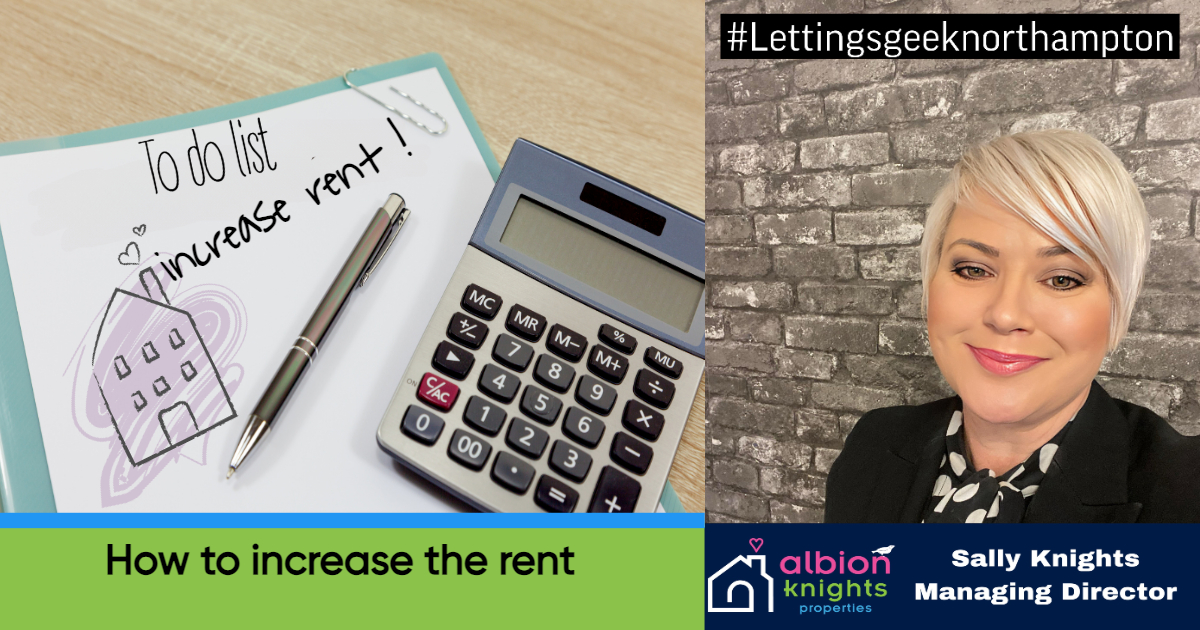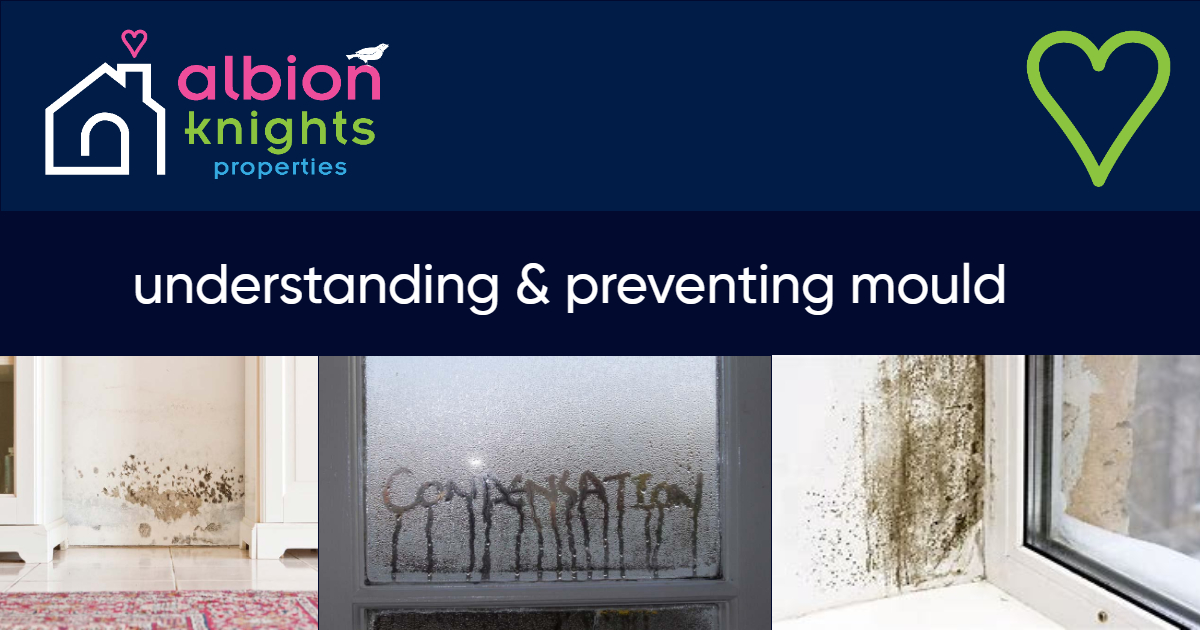Updates & News
- Details
- Hits: 260

If it’s been a while since you reviewed the rent for your tenant, now may a good time to do so. Some landlords opt to keep the rent the same for existing tenants over time, this approach can cause problems for both parties involved.
You may think you’re being kind to your Tenant by keeping the rent lower than market value, but it will hit the tenants hard when they decide to move on and realise they can’t afford to move as they have been paying way under market value. Keeping rents very low lulls the tenant into a false sense of security.
Not reviewing the rent annually means that you’re potentially missing out on funds that could have been used for mortgage payments, essential property maintenance, or investments such as energy-efficient upgrades.
We have landlords who have not increased rents since before lockdown; Then, their low fixed rate mortgage came to an end, and the next thing they know is their mortgage has increased by 100’s of pounds per month! Understandably, the tenant’s pocket will be equally as hard hit when they find out they must pay another £300/£400 on top of their current outgoings.
A more beneficial approach for both parties is to make modest annual increases in line with local market values.
There are three legal methods to increase rent:
1.) By Agreement: Rent increases are often agreed upon with tenants signing a new tenancy agreement at renewal, which minimizes potential disputes. It is important to have proof of agreement, ideally in the form of a signed document or letter.
2.) Through Rent Review Clauses: Some tenancy agreements include rent review clauses, which allow for rent adjustments during the fixed term. These clauses must be fair and usually involve an agreed percentage increase or linkage to an outside index such as the CPHI Index.
3.) Via the Statutory Notice Procedure: This formal procedure provides a framework for increasing rent during periodic tenancies. Landlords must use the prescribed form and give tenants one month's notice of the proposed new rent. If the tenant disagrees with the proposed rent, they can refer it to the First Tier Tribunal for review.
To implement rent increases fairly, consider the following guidelines:
- Consider Tenant Circumstances: Consider the tenant's financial situation and wage increases, as raising the rent beyond their means could lead to tenants struggling to pay the rent leading to arrears. In our experience this can snowball very quickly with some tenants not paying at all rather than something towards the rent.
- Check what is happening in the local rental market: Check the property portals (Rightmove, Zoopla etc) to ensure that you are setting the rent at a competitive rate and that it falls in line with similar properties I the local area. If rents are dropping in the area, it may be best to keep the current rent as it is. If rents are rising rapidly, consider the tenant's individual circumstances and adjust the rent accordingly.
- Improve the Property: Many tenants ask us “what am I going to get in return?”, so it may be worth considering improving the property or offering incentives to tenants to justify the rent increase. This could include upgrading appliances or refreshing the décor. This also can help maintain a more positive landlord-tenant relationship is important.
Tenants often think of Landlords as the big bad wolf; We always explain that increased cost of living affects landlords too and once we advise them of the reasons why the rent is being increased, they seem to be more accepting that the rent must go up.
If you're unsure if you're charging a fair market rent for your Northamptonshire property, it may be helpful to seek advice from professionals. We would be happy to offer guidance in this matter, feel free to drop us an email This email address is being protected from spambots. You need JavaScript enabled to view it. or call us on 01604 874400
Until next time!
Sally
- Details
- Hits: 177

Most landlords that I meet have never given a second thought to the risk of Legionnaires disease in the property they want to rent out. It’s not unusual for a look of utter shock to come over them over them when I start talking about assessing the risk of this potentially fatal disease. I’ve written a comprehensive guide on the why’s and how’s to hopefully make things a little clearer as to why assessing the risk is so important.
As a landlord of a rented residential property in England, it is crucial to prioritize the health and safety of your tenants. One of the key responsibilities is conducting a Legionnaires risk assessment to protect against the potential threat of Legionella bacteria. Legionnaires' disease is a severe form of pneumonia caused by the Legionella bacteria, which can thrive in water systems. In this blog post, we will provide a detailed guide for landlords on conducting a Legionnaires risk assessment, understanding the risks, and implementing necessary measures to prevent Legionella contamination in rented residential properties in England.
Understanding Legionnaires' Disease:
Legionnaires' disease is a potentially fatal respiratory illness caused by inhaling small droplets of water contaminated with Legionella bacteria. Symptoms can range from mild flu-like symptoms to severe pneumonia. It is crucial for landlords to be aware of the risks associated with Legionella bacteria and take appropriate measures to prevent its growth and spread.
Conducting a Legionnaires Risk Assessment:
A Legionnaires risk assessment is a systematic evaluation of the potential sources of Legionella bacteria in a property's water systems. It involves identifying and assessing the risk factors associated with Legionella growth and transmission. Landlords should consider factors such as the type of water system, temperature control, water storage, and the presence of aerosol-generating devices.
Appointing a Competent Person:
Landlords should appoint a competent person to conduct the Legionnaires risk assessment. This person should have the necessary knowledge, skills, and experience to identify and assess the risks associated with Legionella contamination. They may be an external consultant or a qualified member of the landlord's team.
Identifying Risk Factors:
During the risk assessment, the competent person should identify potential risk factors for Legionella growth and transmission. These may include stagnant water, inadequate temperature control, dead legs in the plumbing system, and infrequently used outlets or showers. The assessment should also consider vulnerable individuals, such as the elderly or those with compromised immune systems.
Implementing Control Measures:
Based on the findings of the Legionnaires risk assessment, landlords should implement appropriate control measures to minimize the risk of Legionella contamination. This may include regular monitoring and maintenance of water systems, ensuring appropriate temperature control, and implementing water treatment measures such as chlorination or thermal disinfection.
Documentation and Record-Keeping:
Landlords should maintain detailed records of the Legionnaires risk assessment, including the findings, control measures implemented, and any subsequent actions taken. These records demonstrate compliance with legal requirements and can be useful for future reference or inspections.
Tenant Education and Communication:
Landlords should educate and communicate with tenants about Legionnaires' disease and the control measures in place. This can be done through informational leaflets, the tenancy agreement, or verbal communication. Tenants should be encouraged to report any concerns about water quality, temperature, or other potential risks.
Regular Review and Monitoring:
Legionella risk assessments should be reviewed regularly, especially if there are any changes to the water systems or occupancy of the property. Landlords should also establish a regular monitoring program to ensure ongoing compliance with control measures and identify any potential issues promptly.
Conducting a Legionnaires risk assessment is a crucial responsibility for landlords of rented residential properties in England. By understanding the risks associated with Legionella bacteria, implementing appropriate control measures, and maintaining accurate records, landlords can protect the health and safety of their tenants. Regular review, monitoring, and tenant education are essential for ongoing prevention and compliance. By prioritizing Legionnaires risk assessment, landlords can create a safe living environment and fulfil their duty of care to their tenants.
Legislation alert! - here is the all-important legal bits to back everything up:
Landlords of residential properties in England are required to assess the risk of Legionnaires' disease under the following legislation:
The Health and Safety at Work Act 1974:
This act is the primary legislation that governs health and safety in the workplace, including residential rental properties. Landlords have a legal duty under this act to ensure the health and safety of their tenants, which includes protecting them from the risk of Legionella contamination.
The Control of Substances Hazardous to Health (COSHH) Regulations 2002:
The COSHH regulations require landlords to assess and control the risks associated with hazardous substances, including Legionella bacteria. Landlords must conduct a risk assessment to identify and evaluate the potential sources of Legionella contamination in their properties.
The Approved Code of Practice (ACOP) L8:
The ACOP L8 provides practical guidance on controlling the risk of Legionella in the workplace, including residential properties. Landlords are encouraged to follow the recommendations outlined in the ACOP L8 to prevent Legionella contamination and ensure the safety of their tenants.
These legislations collectively require landlords to assess and manage the risk of Legionnaires' disease in residential properties to protect the health and safety of tenants. Failure to comply with these regulations can result in penalties and legal consequences.
Thanks for reading ......until next time
Yours in property
Sally
- Details
- Hits: 178
At this time of year we receive quite a few complaints from tenants regarding the build up of mould and mildew in their home. We have drafted an information booklet all about this very topic. Feel free to share with your tenant if you have received a similar complaint.
- Details
- Hits: 147

2023 was one of the craziest years on record for us in many ways: A high number of landlords (never seen before) sold their rental properties, there was a record number of people looking for a home to rent, with the ratio of applicant enquiries to one property at around 40 to 1! 2023 saw us put in place the highest number of rent increases ever in one year, driven by the landlords’ soaring costs in terms of mortgage payments, insurances, and property repair costs. Some reported that their mortgage repayments had doubled.
The level of tenant evictions in 2023 was also the highest I have ever seen in my 25 years of being a letting agent. I refer to no fault evictions where the Tenant/s have done absolutely nothing wrong. A no fault eviction is mostly carried out if the landlord wants to sell the property, this gives the tenants just two months to source alternative accommodation. a vast number of tenants who received a no-fault eviction notice found it very difficult to secure a property due to two main factors:
Firstly, the increase in rental prices have made many properties unaffordable, secondly, the level of supply of privately rented accommodation is at an all-time low; even getting an appointment to view a property is difficult.
Local councils have gone as far to advise tenants they should stay in their home until ordered to leave by the court, furthermore they advise them to stay firmly put until the bailiffs turn up to execute the warrant of possession. The tenant taking any other action could run the risk of them making themselves intentionally homeless! This is not my assumption or second-hand information, unfortunately, it’s a fact, and I have had first had experience of dealing with many of these incidences.
So why are the Councils giving tenants this advice? In simple terms, there is a dire supply of social housing and private landlords are being used in the interim to bridge the gap, thus causing a considerable amount of stress for all involved, its clogs up the court system and there are substantial additional costs to the landlord!
In the Governments Homeless Code of Guidance it states: "Housing authorities should not consider it reasonable for an applicant to remain in occupation until eviction by a bailiff.”
Surprisingly, and given that we are in the middle of a cost-of-living crisis, we did not see any significant increase in tenant in rent arrears in 2023.
So, what does 2024 have in store* for landlords? Read on to find out. (*I'm a poet, and I didn't even know it!)
- The Renters' Reform Bill, which aims to make significant changes to the rental market in England, has made progress in becoming law. It has passed a first and second reading, as well as a committee stage. However, the government has announced that the ban on Section 21 evictions will not be implemented until the justice system is reformed. The bill still needs to go through a report stage and third reading in the House of Commons and then pass through the House of Lords. It is unlikely that any laws will be implemented until late 2024 or early 2025, and the upcoming general election could cause further delays and uncertainty.
- Landlords may continue to sell their properties due to challenging conditions. Rising costs, limited tax relief, and changing legislation are some of the reasons why landlords are considering selling. A quarter of landlords have expressed their intention to sell a property before August 2024. Additionally, a third of landlords are considering retiring or leaving the market due to issues with legislation and rising costs. The reduction of the capital gains tax allowance in April 2024 may also influence landlords' decisions. These factors indicate that landlords will continue to evaluate their options in the coming months.
- The next general election, which must take place before the end of January 2025, will have a significant impact on the rental market. Political parties will be keen to gain the support of landlords and tenants by addressing the issues affecting the rental market. Landlords are concerned about confusing and constantly changing government legislation, while tenants are dealing with high rental costs. The Conservative Party has emphasized a "better deal for renters" and the Labour Party has prioritized ending Section 21 evictions and introducing new measures such as compulsory licensing and rent controls. The outcome of the general election will shape the future of the rental market.
- Average rents have been rising rapidly, and this trend is expected to continue in 2024, although at a slower pace. Data from estate agency Hamptons shows that average rental prices peaked in August 2023 and cooled down in the following months. Property consultancy Savills forecasts a rental growth of six percent in 2024, down from the 9.5 percent recorded in 2023. However, rents are expected to reach an "affordability ceiling" in 2025. These projections indicate that many tenants may struggle to afford higher monthly rents.
- Energy efficiency in rental properties will remain a significant topic in 2024. In September 2023, Prime Minister Rishi Sunak announced the scrapping of plans to increase the minimum energy efficiency standard for rental properties. However, the cost of energy bills and the urgency to address climate change will continue to drive discussions on energy efficiency. In an election year, the Conservative government may face pressure to commit to a new plan for boosting energy performance certificate (EPC) ratings. Landlords should stay informed about developments in energy efficiency standards for rental homes.
Other things landlords should keep an eye on in 2024 include the regulation of the short-term lets market, landlord licensing schemes, rising mortgage costs, new rules for property listings (material information), and increasing tax costs. Regulation of short-term lets is expected to be implemented, and details of the regulations should become clear in 2024.
Landlord licensing schemes are being introduced, and consultations for new schemes are underway. Landlords should be aware of potential increases in mortgage costs. New rules from Trading Standards will require landlords to include more information on property listings. Tax costs for landlords are expected to continue rising due to frozen income tax thresholds and the impact of Section 24 changes.
Many thanks for reading, until next time
Yours in property...
Sally
- Details
- Hits: 327
Back in 2019 when Theresa May was Prime Minister, the Government made a promise to Tenants that the private rental sector would be reformed to make it fairer. After four years (Three PM's & six Housing Ministers later...), the current Housing Minister, Michael Gove, gave the first reading of the draft bill to Parliament on 17th May.
The bill is nowhere near ready to be given Royal assent and passed as law (even the the draft wording is yet to be published). Industry experts are forecasting that the bill will not become law until at least Spring 2024.
The main arears of interest to landlords are as follows:
- The scrapping of Section 21 no-fault evictions
- A new law ending landlord blanket rejections of tenants on benefits or who have children
- Easier evictions of poorly behaving tenants
- A legal right to keep pets for renters - with a provision for landlords to demand renters take out insurance to cover the cost of any damage caused by their animals
- The first decent homes standard for private rentals
- A new property ombudsman to quickly deal with conflict between landlords and tenants
- A Property Portal requiring landlords to join a national register
We though that you would like to know more about this, as it has been in the mainstream media today.
The landlords guild have published an article, and you can read more details in the link below:
Renter’s Reform Bill Finally Lands in Westminster | GRL (landlordsguild.com)
The Government publication is here: https://www.gov.uk/government/news/government-introduces-landmark-reforms-to-deliver-fairer-private-rented-sector-for-tenants-and-landlords
Stay Calm... Until next time ..

Sally




